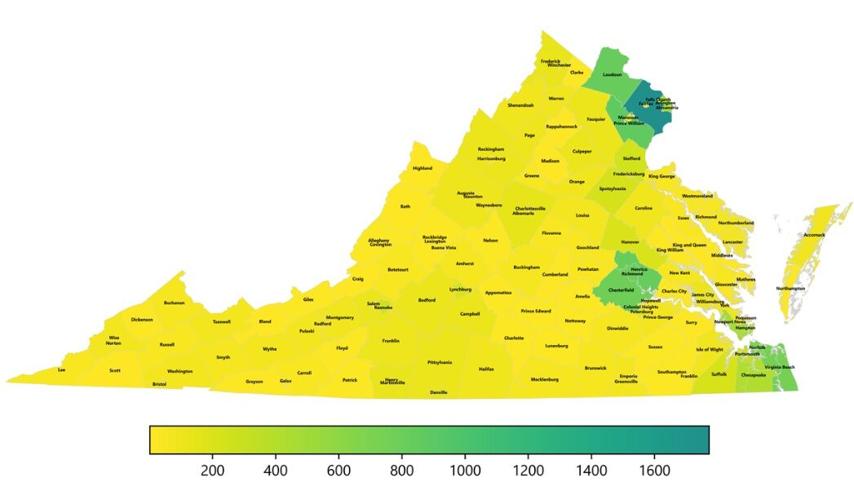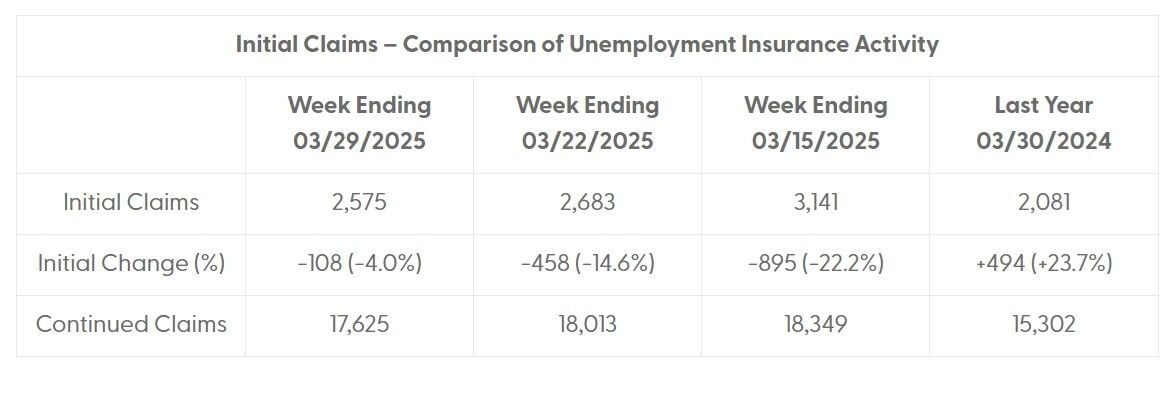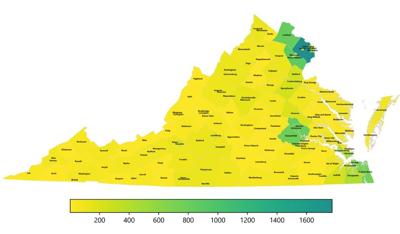Private-sector job postings have plunged. Contracts are being canceled. And across Northern Virginia, laid-off federal contractors are showing up at job centers in growing numbers — a trend officials fear will worsen this summer if deeper federal cuts take effect.
“I’m preparing for the worst,” said David Hunn, executive director of Virginia Career Works Northern Region, which runs job centers in Alexandria, Fairfax, Loudoun and Prince William counties. “We could be looking at thousands of people needing help in the next few months.”
Local economists and workforce officials say this may be only the beginning. A combination of hiring freezes, canceled contracts and agency consolidations — part of President Donald Trump’s effort to shrink the federal workforce — is already straining the region’s job market.
Hunn said many seeking help are federal contractors laid off after agencies like the United States Agency for International Development, or USAID, froze or scaled back grant-funded programs.
“We probably had several hundred either displaced federal workers or contractors,” he said. “And I think probably it’s more contractors right now given the layoffs at USAID, because they had to terminate their employees immediately.”
The early wave of job losses is starting to appear in state labor data. For the week ending March 23, Virginia recorded more than 2,600 new unemployment claims — up nearly 28% from the same week last year — with most filings coming from the professional and technical services sector, which includes many federal contractors.
Since Jan. 12, Northern Virginia has accounted for nearly half of all reported layoffs in the state. According to state Worker Adjustment and Retraining Notification Act, or WARN, notices, at least 1,071 layoffs have occurred in Fairfax, Arlington, and Prince William counties and the city of Alexandria — out of 2,314 statewide. The notices, published by Virginia’s Department of Workforce Development and Advancement, include major employers like MITRE Corporation and Leidos, which hold large federal contracts.
Still, these figures likely understate the true impact. Many Northern Virginia residents work in D.C. and may file unemployment claims there. Federal employees and contractors also use different systems to file, which are often tracked separately.
“We're working with our neighbors to try to get a way to look at this regional data in terms of unemployment claims, because I think that's a better indicator for all of us because of those unique nuances,” Kate Ange, deputy director of Arlington Economic Development, said.

Initial unemployment claims activity for the second half of March.
Further complicating matters are unsettled job statuses among federal workers affected by recent agency shakeups. In February, thousands of probationary employees were terminated under the Trump administration’s plan to consolidate federal agencies under the newly created Department of Government Efficiency, led by Elon Musk.
Because the firings bypassed standard reduction-in-force procedures, they faced immediate legal challenges. Federal judges later ruled the terminations improper and ordered many of the employees reinstated. But on Tuesday the Supreme Court blocked the order for the Trump administration to reinstate the thousands of federal employees. The effect of the court’s order will keep employees in six federal agencies on paid administrative leave for now, the Associated Press reported.
If federal agencies proceed with formal reductions in force, which require a 60-day notice, Hunn said a second wave of layoffs could arrive by summer.
“We’re probably looking, if all of that happens, somewhere between the May and June timeframe,” he said.
A region shaped by federal jobs
Virginia ranks second nationally in full-time federal civilian jobs, with 321,516 positions, according to the Weldon Cooper Center at UVA. Including part-time roles and 130,751 active-duty military personnel, the total nears 476,000.
Much of that workforce is based in Northern Virginia, home to major federal agencies like the Pentagon and firms that rely on government contracts. The Northern Virginia Regional Commission estimates more than 81,000 federal civilian jobs are located in the region, representing 2.7% of the national federal workforce and 6.3% of the state’s. Another 175,000 federal employees live in Northern Virginia but work in D.C. or nearby jurisdictions.
One caveat, however, is that those figures only cover Prince William, Loudoun, Fairfax and Arlington counties and the city of Alexandria. They leave out surrounding areas like Stafford and Spotsylvania counties, where many federal workers and contractors live.
“I have a whole lot of neighbors who are contractors that work either at Fort Belvoir or Quantico,” said Terry Clower, director of the Center for Regional Analysis at George Mason University and a Stafford County resident. “So yeah, those numbers… look a lot different depending on who exactly you include.”

Terry Clower, director of the center for regional analysis at George Mason, speaks at a Northern Virginia Chamber of Commerce economic outlook event in 2022.
Tracking the full impact is further complicated by the employment status of affected workers.
Jill Kaneff, senior regional demographer at the Northern Virginia Regional Commission, said many are on administrative leave or have accepted severance packages, making them ineligible for unemployment benefits.
“So, knowing that they are just going back and forth on being employed and on leave, that's, I think, one of the main reasons why it's not showing up in the claims data yet,” Kaneff said.
Kaneff said upcoming labor reports from the Virginia Employment Commission may provide more clarity given those figures often lag behind real-time trends.
Local industries and governments brace for ripple effects
The growing uncertainty is already shaping how local governments and employers prepare for a potential fallout. Fairfax and Prince William counties are among several jurisdictions tracking early signs of economic stress, including contract activity, tax revenue and office vacancies.
In a March presentation to the Fairfax County Board of Supervisors, Victor Hoskins, president and CEO of the Fairfax County Economic Development Authority, flagged a steep drop in job postings — from 92,000 in February to just 44,000 in March.
“That's contractors pulling back, saying, I'm not going to take the chance on hiring somebody because the business might not be there,” Hopkins said. “Other contractors are saying I don't have a contract anymore.”
He warned the slowdown could spill into other sectors tied to federal spending, deepening the strain on the local economy.
Reduced foot traffic from federal offices is already affecting restaurants, hotels, and retail stores in the D.C. area, putting pressure on meal and lodging tax revenues that support local budgets.
“Staff at the Virginia tourism office are very worried about lower [hotel] occupancy rates and the reduced business conferences and revenue impacts of that on the state budgets,” Kaneff told the Prince William Finance and Budget Committee last month.
Workforce mismatch deepens uncertainty
The long-term economic picture is also troubling. In a worst-case scenario, the Urban Institute projects cutting 75% of the federal workforce in the D.C. region would drive unemployment up to 9.6%, over three times the current rate of 2.3%.
Even a 10% cut, according to the Weldon Cooper Center, would eliminate about 40,000 jobs in Virginia — enough to cancel out all of the state’s expected job growth for 2025.
To help displaced workers, Gov. Glenn Youngkin launched a website in February with listings for more than 250,000 private-sector openings, along with job fairs and retraining resources.
But many of those jobs may not align with the experience or salary expectations of laid-off federal employees and contractors. “At best, you got about maybe a 30% overlap,” Clower said. “It’s not particularly favorable.”
That mismatch is already evident at job centers, where Hunn said some are retraining or considering leaving the region.
“Some of these federal employees are going to be specialists in particular areas — whether it’s small business, foreign affairs or soil science,” Hunn said. “We’re really trying to prepare individuals for possible career shifts, whether they want to stay in public service or move into another occupation.”
His team is working to place people in jobs starting at $22 an hour or more, but for many, it’s still a difficult shift in a region with a high cost of living. To reach more affected workers, they’re launching a Metro ad campaign targeting commuters who may not know these resources exist.
“We’re a free public service, and we’re here to help them,” Hunn said. “Should they need to make a career change, we want them to know we’re here.”
How many will ultimately need that support remains unclear. But after decades working in workforce development, Hunn said this moment feels different.
“I’ve been in this business for 37 years,” he said. “I’ve not seen anything like this before.”








(14) comments
Wherever you came from is your home. Leave here, live there.
Bye!
The reason Virginia is wealthy is thanks to Yankees and West Coasters moving here. Raising the education level and the median income. Without us, Virginia would be just like West Virginia (where you would better fit).
Yeah sorry no....Go back to the west coast buddy.
Virginia's arms and defense manufacturing industry contributes significantly to the state's economy, providing thousands of high-paying jobs and generating billions of dollars in economic activity.
We don't make many weapons systems in Virginia. Our economy is based on healthcare, professional services (consulting, IT, finance), Government workers, retail, with manufacturing a distant fifth.
You or biden... can't tell which has less brains.
Virginia is gonna do great; Libs can't use their useless degrees in government anymore.
Fixed it for you.
Ah yes, useless degrees argument. I am sure another country would love to know what they know.
Says a person who clearly never finished college. I support a higher minimum wage so that low skill people like you can get off the dole paid for by people like me.
[thumbup]
Good news. Trim the fat. My tax dollars shouldn't support a jobs program for useless freeloaders. Bonus, will free up real estate in NOVA.
For it to affect you you’d have to be a productive member of society, not a full time internet troll. You clearly need to get out of your dank basement. Some human interaction and a hug might cure you of your impotent rage.
[thumbup]
💩
Welcome to the discussion.
Log In
Keep it Clean. Please avoid obscene, vulgar, lewd, racist or sexually-oriented language.
PLEASE TURN OFF YOUR CAPS LOCK.
Don't Threaten. Threats of harming another person will not be tolerated.
Be Truthful. Don't knowingly lie about anyone or anything.
Be Nice. No racism, sexism or any sort of -ism that is degrading to another person.
Be Proactive. Use the 'Report' link on each comment to let us know of abusive posts.
Share with Us. We'd love to hear eyewitness accounts, the history behind an article.